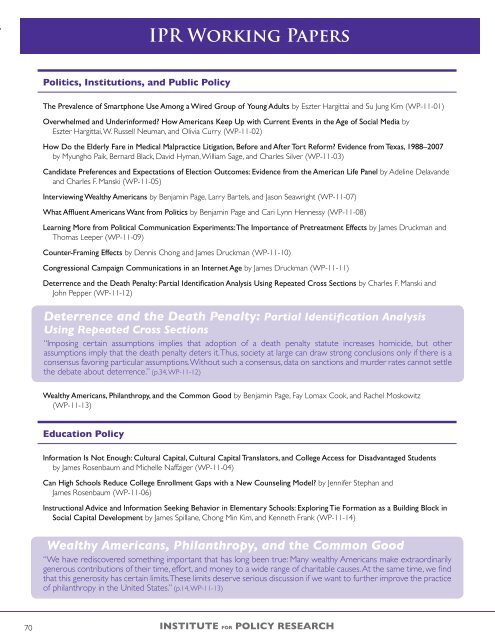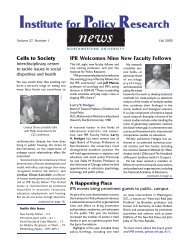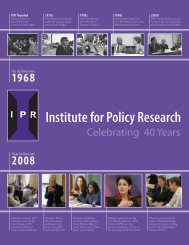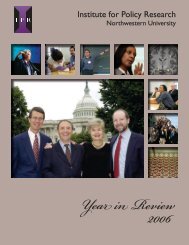Highlights of 2011 - Institute for Policy Research - Northwestern ...
Highlights of 2011 - Institute for Policy Research - Northwestern ...
Highlights of 2011 - Institute for Policy Research - Northwestern ...
You also want an ePaper? Increase the reach of your titles
YUMPU automatically turns print PDFs into web optimized ePapers that Google loves.
IPR Working Papers<br />
Politics, Institutions, and Public <strong>Policy</strong><br />
The Prevalence <strong>of</strong> Smartphone Use Among a Wired Group <strong>of</strong> Young Adults by Eszter Hargittai and Su Jung Kim (WP-11-01)<br />
Overwhelmed and Underin<strong>for</strong>med? How Americans Keep Up with Current Events in the Age <strong>of</strong> Social Media by<br />
Eszter Hargittai, W. Russell Neuman, and Olivia Curry (WP-11-02)<br />
How Do the Elderly Fare in Medical Malpractice Litigation, Be<strong>for</strong>e and After Tort Re<strong>for</strong>m? Evidence from Texas, 1988–2007<br />
by Myungho Paik, Bernard Black, David Hyman, William Sage, and Charles Silver (WP-11-03)<br />
Candidate Preferences and Expectations <strong>of</strong> Election Outcomes: Evidence from the American Life Panel by Adeline Delavande<br />
and Charles F. Manski (WP-11-05)<br />
Interviewing Wealthy Americans by Benjamin Page, Larry Bartels, and Jason Seawright (WP-11-07)<br />
What Affluent Americans Want from Politics by Benjamin Page and Cari Lynn Hennessy (WP-11-08)<br />
Learning More from Political Communication Experiments: The Importance <strong>of</strong> Pretreatment Effects by James Druckman and<br />
Thomas Leeper (WP-11-09)<br />
Counter-Framing Effects by Dennis Chong and James Druckman (WP-11-10)<br />
Congressional Campaign Communications in an Internet Age by James Druckman (WP-11-11)<br />
Deterrence and the Death Penalty: Partial Identification Analysis Using Repeated Cross Sections by Charles F. Manski and<br />
John Pepper (WP-11-12)<br />
Deterrence and the Death Penalty: Partial Identification Analysis<br />
Using Repeated Cross Sections<br />
“Imposing certain assumptions implies that adoption <strong>of</strong> a death penalty statute increases homicide, but other<br />
assumptions imply that the death penalty deters it. Thus, society at large can draw strong conclusions only if there is a<br />
consensus favoring particular assumptions. Without such a consensus, data on sanctions and murder rates cannot settle<br />
the debate about deterrence.” (p.34, WP-11-12)<br />
Wealthy Americans, Philanthropy, and the Common Good by Benjamin Page, Fay Lomax Cook, and Rachel Moskowitz<br />
(WP-11-13)<br />
Education <strong>Policy</strong><br />
In<strong>for</strong>mation Is Not Enough: Cultural Capital, Cultural Capital Translators, and College Access <strong>for</strong> Disadvantaged Students<br />
by James Rosenbaum and Michelle Naffziger (WP-11-04)<br />
Can High Schools Reduce College Enrollment Gaps with a New Counseling Model? by Jennifer Stephan and<br />
James Rosenbaum (WP-11-06)<br />
Instructional Advice and In<strong>for</strong>mation Seeking Behavior in Elementary Schools: Exploring Tie Formation as a Building Block in<br />
Social Capital Development by James Spillane, Chong Min Kim, and Kenneth Frank (WP-11-14)<br />
Wealthy Americans, Philanthropy, and the Common Good<br />
“We have rediscovered something important that has long been true: Many wealthy Americans make extraordinarily<br />
generous contributions <strong>of</strong> their time, ef<strong>for</strong>t, and money to a wide range <strong>of</strong> charitable causes. At the same time, we find<br />
that this generosity has certain limits. These limits deserve serious discussion if we want to further improve the practice<br />
<strong>of</strong> philanthropy in the United States.” (p.14, WP-11-13)<br />
70 INSTITUTE FOR POLICY RESEARCH

















